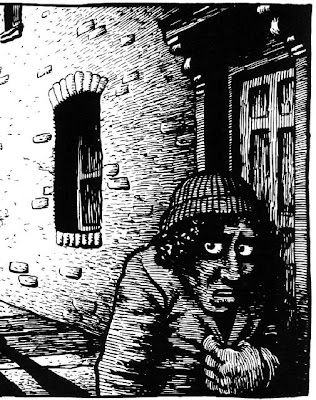Jean Trounstine : Italian Prison Inmates Perform Theatre Behind Bars
 |
| Italian prison inmate performing in Romeo and Juliet: Mercutio Does Not Want to Die. Photo by Clara Vannucci for The New York Times. |
Theatre in an Italian prison
Punzo says that it is not therapy that drives him but creating good theatre.By Jean Trounstine / The Rag Blog / May 30, 2013
I've been interested for years in the Italian prison theatre company recently featured in a The New York Times report. Since 1988, Compagnia della Fortezza, the company named after the Medici-era fortress that houses the Volterra jail where the men are imprisoned, has performed a variety of Italian spectacles and tragedies.
From Alice in Wonderland, a Theatrical Essay on the End of a Civilization to Romeo and Juliet: Mercutio Does Not Want to Die, director Amando Punzo has dedicated himself to art behind bars.
The photo above is one of many in the photo essay by Clara Vannuci, an Italian photographer who has documented in amazing pictures the essence of Punzo's vision.
For 21 years, working five hours a day, six days a week, Punzo has embarked on a challenging repertoire for the company, including, per the Times, in an article from 2009, "plays based on works by Brecht, Peter Handke, and even the tale of Pinocchio." He says that it is not therapy that drives him but creating good theatre.
I too felt that way during the run of eight plays I directed behind bars. The idea was not to go after building self-esteem -- although that happened -- but to go after revealing the truth of the play and getting the women to be the best they could be at portraying their roles.
We did plays at Framingham Women’s Prison in Massachusetts that expanded the women’s horizons and gave them access to literature -- ranging from Shakespeare to Aristophanes.
Here is Dolly dressed as a Suffragette in Lysistrata, the famous play where women refuse to have sex with their spouses until they end war:
 |
| Scene from Lysistrata, performed at Framingham Women's Prison in Massachusetts. |
Punzo says, “It’s not about giving the inmates an outlet or a recreational break. It’s work.” The side effects of theatre programs behind bars are self-respect, community building, and a love for the stage.
In the United States, it is a struggle to get plays inside, in fact to create anything worthwhile. The goal of prison is repression. The goal of education is expansion and opening one’s mind to the world. The goal of art is freedom and beauty.
But the Italians love art so much, the rumor goes, that prisons would rather risk an arrest than not show their performances to other Italians. Many plays tour and many prisoners work outside during the day. And believe it or not, over half the 205 prisons in Italy have acting companies.
Compagnia della Fortezza has won some of Italy’s most prestigious theatre awards and houses a gourmet restaurant where prisoners work and serve food to the public.
The 2009 production of Alice in Wonderland, a Theatrical Essay on the End of a Civilization (photo below) was loosely based on Lewis Carroll’s masterwork, but the text wove in soliloquies from other authors, in this case Shakespeare (predominantly Hamlet) but also Genet, Pinter, Chekhov, and Heiner Müller.
 |
| Inmates perform in Alice in Wonderland, a Theatrical Essay on the End of a Civilization. Photo by Sondro Michalles for The International Herald Tribune. |
While Punzo, who has an acting background, creates a new play every July, his dream is to create a stable repertory company, with a winter season and a permanent theater, which would allow him to pay the actors. Ah Italy!
Photographer Vannuci relayed in the Times article how she asked a prisoner why no one tried to escape. The response reflected how much theatre has the potential to change lives: “Why should I run? Where would I go? Twenty years I’ve lived in prison. Now I have something to live for. Life has meaning.”
[Jean Trounstine is an author/editor of five published books and many articles, professor at Middlesex Community College in Massachusetts, and a prison activist. For 10 years, she worked at Framingham Women's Prison and directed eight plays, publishing Shakespeare Behind Bars: The Power of Drama in a Women's Prison about that work. She blogs for Boston Magazine and takes apart the criminal justice system brick by brick at jeantrounstine.com where she blogs weekly at "Justice with Jean." Find her other contributions to The Rag Blog here.]
The Rag Blog




















